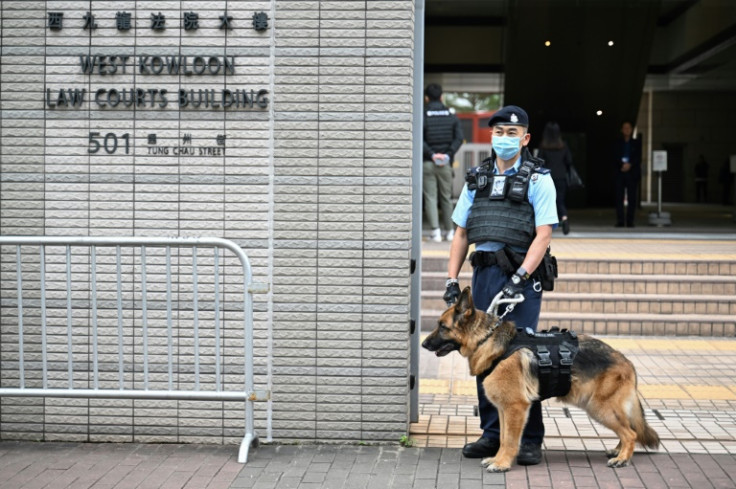
Donning hats, scarves and masks to shield their faces from the winter cold, a small group of supporters of pro-democracy media tycoon Jimmy Lai waited overnight outside a Hong Kong court for the start of his long-awaited national security trial on Monday.
First in line was Jolly Chung, who arrived at 10:00 pm (1400 GMT Sunday) the night before, parking herself on the pedestrian pavement.
"I don't want him to appear in court and find no one attending the hearing," she told AFP, huddled in her parka as she braced for a long night of waiting.
Imprisoned for more than 1,100 days, Lai is the founder of the now-shuttered tabloid Apply Daily -- one of the few Chinese-language publications that supported the massive, at times violent, pro-democracy protests that kicked off in Hong Kong in 2019.
The 76-year-old now stands accused of "collusion" with foreign forces under a sweeping national security law Beijing imposed in 2020, charges that the United States and Britain have condemned.
By morning, Chung was joined by about 30 others, some sitting on small stools and using umbrellas to hide their faces from the media, as a heavy police presence blanketed the outside of the West Kowloon court.
Some police officers wore full tactical gear, while others guarded the court entrance with sniffer dogs. An armoured vehicle was also seen by AFP reporters.
Ryan, who gave only his first name, said he woke up early to go to the court because he wanted to "witness history".
"Lai has not given up after being jailed for three years," the 24-year-old postgraduate student told AFP.
"I want to let him know that someone cares."
Born in mainland China, Lai was smuggled into Hong Kong as a stowaway at the age of 12 and worked in sweatshops before building the hugely successful Giordano clothing empire.
He established his first publication shortly after China sent tanks to crush protests in Beijing's Tiananmen Square in 1989, writing columns that regularly criticised senior Chinese leaders.
In 1995, he founded Apple Daily, a hugely popular tabloid in Hong Kong that mixed heady sensationalism with hard-hitting business and political reportage.
After Beijing imposed the national security law on the financial hub in 2020, authorities raided Apple Daily twice before forcing it to close in 2021.
Lai's trial is seen as a barometer of freedom in Hong Kong, which operates under a common law system separate from the mainland thanks to its British colonial history.
"I consider Jimmy Lai a hero," said an artist surnamed Sung, who had waited outside the court since 4:00 am (2000 GMT Sunday).
"He is choosing to embrace this suffering."
Sung said he only realised how vibrant Hong Kong's media landscape had been after the national security law came into force and shut out all opposition voices.
"The (national security law) is like... a dark spell," he told AFP, calling his wait outside the court a show of "solidarity".
"I am here to be his witness, so both of us are less alone."








